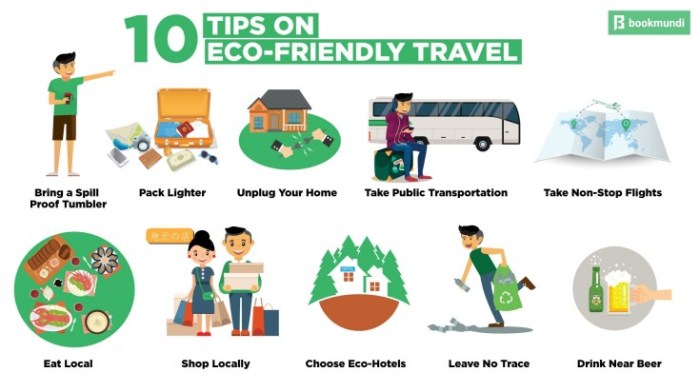In the realm of travel, embracing eco-friendly practices is no longer a mere aspiration but a conscious choice that empowers us to explore the world while preserving its beauty. Delving into the depths of eco-friendly travel tips, this introduction immerses readers in a unique and compelling narrative, with casual formal language style that is both engaging and thought-provoking from the very first sentence.
As we embark on our journeys, let us become mindful travelers, embracing sustainable practices that minimize our environmental impact. From choosing eco-friendly transportation options to supporting local communities, each decision we make has the power to shape a more sustainable future for travel.
Eco-friendly Transportation
Choosing eco-friendly transportation options is crucial for reducing our environmental impact while traveling. Different modes of transportation have varying levels of emissions and resource consumption.
When embarking on your next luxurious adventure, consider incorporating eco-friendly practices to minimize your environmental impact. Explore top luxury travel destinations while prioritizing sustainable choices. Opt for accommodations with eco-certifications, utilize public transportation or electric vehicles, and pack reusable items to reduce waste.
Air travel is a major contributor to carbon emissions. Opting for rail or bus travel instead, especially for shorter distances, can significantly reduce your carbon footprint. Electric vehicles (EVs) and hybrid vehicles are also more environmentally friendly than gasoline-powered vehicles.
Public Transportation
Utilizing public transportation, such as buses, trains, or subways, is an excellent way to minimize your carbon footprint. These modes of transportation efficiently transport numerous passengers, reducing the number of vehicles on the road and the associated emissions.
Sustainable Accommodation
Sustainable accommodation is an environmentally conscious approach to hospitality that minimizes the impact on the planet while providing a comfortable and enjoyable experience for guests. From eco-friendly practices to green certifications, there are numerous ways to choose accommodations that align with your values.
When planning your eco-friendly travels, consider exploring UNESCO World Heritage Sites. These sites are recognized for their cultural or natural significance and offer a glimpse into the world’s diverse heritage. By visiting these sites responsibly, you can minimize your environmental impact and contribute to their preservation for future generations.
Green Certifications, Eco-friendly travel tips
Green certifications are a valuable indicator of a hotel or resort’s commitment to sustainability. These certifications are awarded by independent organizations that evaluate properties based on their environmental performance. Some of the most well-known certifications include:
- LEED (Leadership in Energy and Environmental Design)
- Green Key
- EarthCheck
Eco-Friendly Practices
Many hotels and resorts are implementing eco-friendly practices to reduce their environmental footprint. These practices may include:
- Using renewable energy sources
- Conserving water and energy
- Reducing waste
- Sourcing sustainable materials
- Educating guests about sustainability
Locally-Owned Guesthouses and Vacation Rentals
Staying in locally-owned guesthouses or vacation rentals can also be a more sustainable option. These accommodations often support the local economy and promote cultural exchange. Additionally, they may be more likely to implement eco-friendly practices due to their smaller scale.
Responsible Dining

Sustainable dining practices are crucial in reducing the environmental impact of our food choices. From farm to table, every step in the food supply chain has an ecological footprint.
Restaurants and cafes play a significant role in promoting responsible dining. They can prioritize locally sourced ingredients, reducing transportation emissions and supporting local farmers. Offering plant-based options and reducing meat consumption helps minimize greenhouse gas emissions associated with animal agriculture.
Reducing Food Waste
Food waste is a major environmental problem. Restaurants and cafes can implement strategies to minimize waste, such as:
- Composting food scraps to create nutrient-rich soil
- Offering smaller portion sizes to avoid overconsumption
- Donating surplus food to local charities
Supporting Local Businesses
Supporting local businesses is essential for sustainable dining. Local food sources reduce transportation distances, minimize packaging waste, and support the local economy.
Look for restaurants that prioritize seasonal and locally sourced ingredients. These establishments often have stronger relationships with local farmers and contribute to the preservation of traditional food systems.
Eco-friendly Activities
Embarking on eco-friendly activities is an essential aspect of responsible travel. These experiences not only minimize environmental impact but also promote conservation and support local communities.
When selecting tours and activities, consider their impact on the environment. Choose operators that prioritize sustainability, such as those using low-emission vehicles or supporting conservation initiatives.
Respecting Wildlife and Natural Habitats
- Observe wildlife from a respectful distance, avoiding disturbing their behavior or habitats.
- Stay on designated trails and avoid trampling vegetation or disturbing sensitive ecosystems.
- Dispose of waste properly and avoid leaving any trace of your presence in natural areas.
Sustainable Souvenirs and Local Support
When purchasing souvenirs, opt for locally made, eco-friendly items that support artisans and reduce waste. Avoid purchasing endangered species or products that contribute to environmental degradation.
Support local communities by patronizing small businesses, employing local guides, and participating in cultural activities that promote understanding and appreciation.
Waste Reduction
Waste reduction is crucial while traveling to minimize our environmental impact. Plastic waste and disposable items pose significant threats to ecosystems, wildlife, and human health.
Packing Reusable Items
Pack reusable items such as water bottles, utensils, coffee mugs, and shopping bags. Avoid single-use plastics like straws, plastic bags, and disposable cutlery.
Reducing Single-Use Plastics
Bring your own toiletries in reusable containers instead of using hotel-provided toiletries. Opt for products with minimal packaging or use biodegradable packaging. Consider using reusable food wraps instead of plastic wrap or aluminum foil.
Offsetting Carbon Emissions
Offsetting carbon emissions is a crucial aspect of eco-friendly travel. It involves compensating for the greenhouse gases released during travel by investing in projects that reduce or remove an equivalent amount of emissions elsewhere.
When embarking on eco-friendly travel, consider exploring sustainable travel destinations that prioritize environmental conservation and community well-being. These destinations offer opportunities to immerse yourself in natural wonders while minimizing your impact on the environment. By embracing eco-friendly practices, you can support local economies and preserve the beauty of these destinations for future generations.
There are numerous carbon offsetting programs available, ranging from tree planting to renewable energy initiatives. The credibility of these programs varies, so it’s important to research and choose reputable organizations certified by reputable third-party standards, such as the Gold Standard or Verified Carbon Standard.
Calculating and Offsetting Emissions
To calculate your travel emissions, use online calculators provided by organizations like the World Wildlife Fund or the International Air Transport Association (IATA). Once you have an estimate, you can purchase carbon offsets through the chosen program. The amount you offset should match the emissions generated by your trip.
Technology for Eco-friendly Travel

The advancement of technology has revolutionized the travel industry, and it continues to play a significant role in promoting sustainable travel practices. Apps and websites provide travelers with valuable information and tools to make eco-friendly choices throughout their journey.
Travel Planning and Booking
* Online travel agencies and search engines allow travelers to filter search results based on sustainability criteria, such as carbon emissions, eco-friendly accommodations, and responsible tour operators.
* Apps like Ecosia, a search engine that plants trees with its profits, contribute to reforestation efforts.
* Travel planning websites like Pack Up + Go offer curated itineraries that prioritize sustainability, minimizing environmental impact.
Transportation
* Ride-sharing and carpooling apps like Uber and Lyft provide alternatives to single-occupancy vehicles, reducing traffic congestion and emissions.
* Electric vehicle rental services, such as Tesla and Hertz, offer travelers low-carbon transportation options.
* Public transportation apps, like Citymapper, provide real-time information on bus, train, and subway routes, encouraging travelers to opt for public transportation.
Accommodation
* Eco-friendly accommodation booking platforms like Green Key and Bookdifferent connect travelers with hotels and guesthouses that adhere to sustainability standards.
* Apps like Airbnb and Vrbo allow travelers to rent homes or apartments, reducing the need for hotel construction and energy consumption.
* Smart home devices, like Nest thermostats, help travelers optimize energy usage in their accommodations.
Activities
* Sustainable tourism apps like Geotourist and Tripadvisor provide information on eco-friendly activities and attractions.
* Virtual reality and augmented reality technologies allow travelers to experience destinations virtually, reducing the need for physical travel.
* Online platforms like Airbnb Experiences and Viator offer immersive cultural experiences that support local communities and preserve cultural heritage.
Waste Reduction
* Zero-waste apps like Litterati and Plastic Free Challenge encourage travelers to reduce waste by tracking and mapping plastic pollution.
* Reusable water bottle apps, like Refill, help travelers find refill stations, reducing the use of single-use plastic bottles.
* Eco-friendly packing guides and apps provide tips on packing light and minimizing waste.
Education and Awareness: Eco-friendly Travel Tips
Promoting eco-friendly travel practices is crucial for preserving the environment and ensuring sustainable tourism. Educating travelers about the impact of their choices and inspiring them to adopt eco-conscious habits is essential.
Travel companies play a significant role in promoting sustainable tourism. By incorporating eco-friendly practices into their operations, they can set an example for travelers and raise awareness about the importance of responsible travel.
Raising Awareness and Inspiring Travelers
- Provide travelers with information about the environmental impact of their travel choices.
- Share success stories and case studies of eco-friendly travel initiatives.
- Organize workshops, webinars, and events to educate travelers about sustainable practices.
- Collaborate with influencers and travel bloggers to spread the message about eco-friendly travel.
- Create online platforms and resources that provide travelers with practical tips and advice on how to travel sustainably.
Ending Remarks

In conclusion, embracing eco-friendly travel tips is not merely about following a set of rules, but about fostering a deep-rooted connection with the destinations we visit and the planet we inhabit. As we navigate the world with a mindful approach, we become ambassadors of sustainable tourism, inspiring others to adopt eco-conscious practices and preserve the beauty of our shared heritage for generations to come.
Question Bank
What are some simple ways to reduce my carbon footprint while traveling?
Opt for low-carbon transportation options like trains or buses, consider carbon offsetting programs, and pack light to reduce fuel consumption.
How can I choose eco-friendly accommodations?
Look for accommodations with green certifications, energy-efficient appliances, and sustainable practices like water conservation and waste reduction.
What are some tips for reducing waste while traveling?
Pack reusable items like water bottles, utensils, and shopping bags, avoid single-use plastics, and support businesses that prioritize waste reduction.